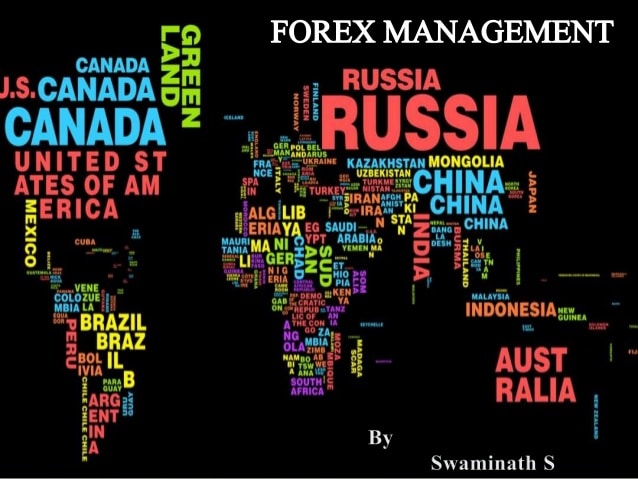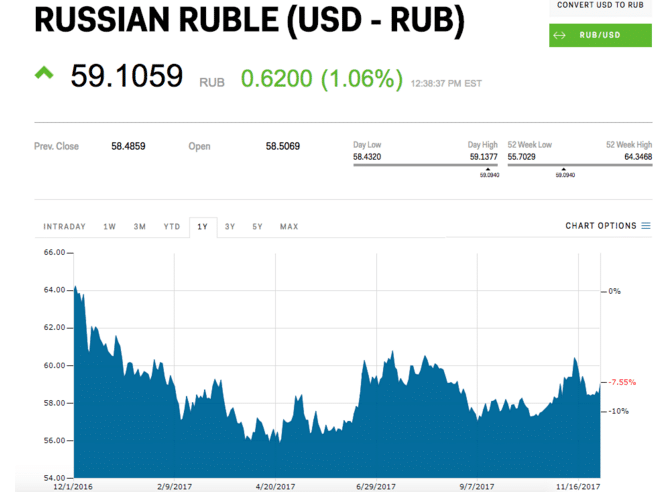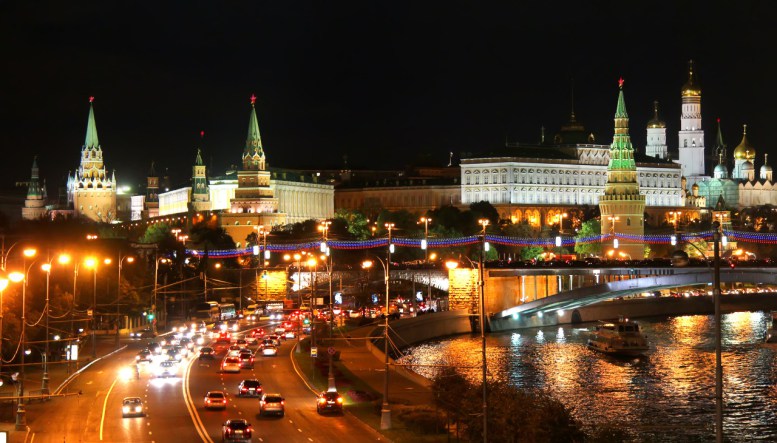When one thinks of the leading edge of foreign exchange trading, one immediately thinks about the West, especially developed economies where infrastructure and standards of living are the highest. If you were to start with an open mind, however, and then reach your conclusion based on the number of articles appearing in the financial press related to foreign exchange, then you would have to acknowledge that the one country on the forefront of activity would undeniably be – Russia.
Read all forex articles.
Yes, Mother Russia dominates much of the news in the forex world of late, primarily because innovation and a changing landscape are the name of the game in this jurisdiction, more so than with most any other developing or developed region on the planet. In fact, if news articles are any indication, the forex activities in Russia are broad based by nature. In other words, everywhere you look major change is taking place, whether it be from a government policy level dealing with crypto-currencies or fraud prevention, all the way down to how brokers are reacting to new rules and regulations.

A few years back, Russia was in the press more than not due to its preponderance of online hackers that had even taken over the national forex exchange, thereby threatening the very value of the Ruble on the international plane. The central bank may have been quick to respond, but hackers soon turned their attention to cross-border acts of cyber-crime. It was not that long ago that the “Wanna-Cry” ransomware attack gained global notoriety. At the time, it was thought to be of North Korean origin, but a similar attack occurred soon thereafter, targeting corporate entities in the Ukraine, an ongoing jurisdictional feud that had also piqued geopolitical tensions for some time.
The tone of recent articles, however, has shifted. No longer are we bombarded with reports about how competent Russians can be acting in nefarious ways, but we are beginning to read more about how the Russian forex market is alive with opportunity. And why not? Russia has over 144 million inhabitants, and its economy is number six on the hit parade, when purchasing power parity is taken into account. With demographics such as these and an online infrastructure that is teeming with activity, what competent businessman would not try to penetrate this market, establish a permanent beachhead, and then achieve geometric growth and prosperity to beat the band?
In this article, we will highlight the following four areas of interest:
1) General fraud landscape for 2017
2) Market potential for foreign exchange products
3) Interplay between the central bank and the brokerage community
4) Burgeoning crypto-currencies and local reactions
The majority of press clippings related to Russia fall within the above framework, but there is not a single industry rag that has chosen to ignore the goings on in this turbulent market environment. The days of the “Wild, Wild West” in Russia appear to have waned. Government entities are quick to flex their muscles when fraud attempts to raise its ugly head. Reactions may or may not follow the general mainstream in more Western enclaves, but no one is shying away from the action. The market is active. Brokers are flooding the region, and notions related to crypto-currencies and blockchain technology are gaining support and benefiting from local involvement and innovation.
#1 – General fraud landscape for 2017
The year started with the publishing of a very favorable report by the central bank that financial fraud had actually declined in 2016. In and of itself, this report would have been good news, but, when every other regulatory agency and central bank across the globe is reporting skyrocketing consumer complaints and fraud losses, Russia almost seems like a remote island, free from the storm. Per the report, losses from fraud declined from $92 million in 2015 down to below $34 million in 2016. Criminal codes were toughened, especially in the area of pyramid schemes, which now carry a six year jail term and a fine of RUB 1.5 million (USD $25,000). Local data suggest that a new pyramid scheme emerges in Russia every 48 hours.
Does the forex market have similar fraud demographics? Complaints here stem from solicitations by foreign forex brokers, expressly forbidden by local law. Complaints fell from 236 to 210 in 2016. Russia has instituted tough rules in this arena, as well, requiring all forex brokers to acquire a license, become a member of the Russian Forex self-regulatory organization, maintain a minimum capital position of RUB 100 million, and contribute RUB 2 million to the national Compensation Fund. Only seven firms have received licenses to date (Alpari Forex, VTB 24 Forex, Teletrade Group, TrustForex, Finam Forex, Instaforex, and Forex Club), while nine more brokers have filed their applications.
#2 – Market potential for foreign exchange products
Although seven forex brokers have set up shop in Russia, local compliance rules forbid advertising until 2018. These brokers are relying upon their brand recognition and the ingenuity of Russian traders to find their websites and begin trading. Russian authorities have been slow to open the forex floodgates for trading foreign currencies, but they have been open to approving most any application that has been filed. By any measure, the trading market in Russia has enormous potential, and time will tell if foreign investment is justified going forward.
One arena that has not been either dealt with or constrained by new regulations is the binary option industry. Current law presently ignores options and CFDs, accepting that they are just another form of betting, which has been the case in the UK for some time. A recent Forbes report, however, claims that “29% of the visits of four of the biggest binary options websites in April” are from Russian clients. The mindset of many Russians does not freely give its trust to local regulatory or government institutions. There remains a preference to moves funds cross-border and deal directly with a foreign-based entity. As has been the plight of a host of other consumers, Russians have fallen prey to binary option scams right and left. Fraud will continue until the Bank of Russia responds, although there have been hints from other junior officials that a ban is coming.
#3 – Interplay between the central bank and the brokerage community
Not all offshore forex brokers operating in Russia have obtained the necessary licenses and complied with additional requirements, established by the Bank of Russia after it officially became the chief regulator of the foreign exchange market. One of these brokers, JFD, has already announced that it will be departing the scene. Several foreign brokers have already established beachheads in Russia and consider it a very healthy market. Per one analyst, “Traders from Russia are themselves very familiar with the Forex Market and are also considered to be highly educated.”
The question going forward is how will the brokerage industry adjust to the new rules that have been implemented in the past year? When capital requirements were implemented in the U.S. market, several brokers immediately exited, while others followed when leverage was limited to “50:1”. The Bank of Russia has followed this path, and it remains to be seen if offshore brokers, prohibited under the new regulations, will bite the bullet and comply. The law expressly requires a physical presence in Russia, along with capital and compensation fund deposits. The Bank of Russia has also requested the blocking of 130 websites for foreign brokers that have yet to apply for a license. Cooperation with global regulators, however, is at present non-existent.
#4 – Burgeoning crypto-currencies and local reactions
Crypto-currencies have recently taken the investing world by storm, but in Russia, officials have treated them, especially Bitcoin, with suspicion and derision. There is to be no other legal tender in the Russian Federation except the Ruble, full stop. In one recent case, prosecutors noted that, “At the present moment the legal status of crypto-currencies is not defined in the Russian Federation. Any offering of virtual currency exchange by Russian entities is considered an involvement in suspicious practices in breach of the anti-money laundering and counter-terrorism financing laws.”
Legislation signed by Vladimir Putin actually requires that laws be adopted by July 1, 2018 that define the status of digital technologies and associated concepts, including distributed ledger technologies, crypto-currencies, tokens and smart-contracts. The rules should also cover mining aspects, already seen to be a welcomed venture in several Russian districts, and how they are to be taxed. Will Russia reverse its current tough position on crypto-currencies? For now, the future is uncertain.
How has the Ruble reacted versus the USD over the past year?
The fate of the Ruble is inexorably linked with oil prices and anything that might impact the flow of funds for Russian exports of crude. The U.S. Dollar, however, has had a down-up-down year, plagued by second-guessing of the Fed and the inability of the Trump administration to follow through on its campaign promises related to tax reform and the economy. The USD index started 2017 just above the 102 mark, only to fall for nine straight months down to 91. It momentarily regained territory, spurting to 95 in November, but has since fallen to below 93, based again on the Fed and Trump’s intransigence.

The Ruble, however, had benefited to a small degree, improving from 60 to the Dollar to roughly 56. Coordination of agreements with OPEC on oil production quotas had helped, but the foreboding legal investigations into Trump’s staff’s collaboration with Russian officials has had a deleterious effect. As a result, the Ruble versus the USD sits at 59, losing a full percentage point, based on the latest revelations of the special counsel’s proceedings. Will the Ruble continue to weaken or regain strength? Whatever the outcome, its relationship with the greenback has been reasonably stable over the past year, having chosen to move within the tight boundaries depicted in the above chart.
Concluding Remarks
The evolution of the forex trading market in Russia has astonished many industry experts. The future is as bright as the lights along the Moscow River and Red Square.

Any preconceptions that corruption and lawlessness might rule in place of the government’s rule-of-law are long past present realities. The market is expanding and thriving. Central bank underpinnings are a given. New rules and regulations are achieving their expected result – the containment of any attempts at fraud by organized crime. In the meantime, brokers are adjusting to accommodate expected constraints on binary options, while also observing any allowances for cryptocurrency product lines. As 2018 unfolds, it will be interesting to follow the news reports emanating from this region.
Related Articles
- Forex vs Crypto: What’s Better For Beginner Traders?
- Three Great Technical Analysis Tools for Forex Trading
- What Does Binance Being Kicked Out of Belgium Mean for Crypto Prices?
- Crypto Traders and Coin Prices Face New Challenge as Binance Gives up its FCA Licence
- Interpol Declares Investment Scams “Serious and Imminent Threat”
- Annual UK Fraud Audit Reveals Scam Hot-Spots
Forex vs Crypto: What’s Better For Beginner Traders?
Three Great Technical Analysis Tools for Forex Trading
Safest Forex Brokers 2025
| Broker | Info | Best In | Customer Satisfaction Score | ||
|---|---|---|---|---|---|
| #1 |
|
Global Forex Broker |

BEST SPREADS
Visit broker
|
||
| #2 |
|
Globally regulated broker |

BEST CUSTOMER SUPPORT
Visit broker
|
||
| #3 |
|
Global CFD Provider |

Best Trading App
Visit broker
|
||
| #4 |
|
Global Forex Broker |

Low minimum deposit
Visit broker
|
||
| #5 |
|
Global Forex Broker |

Low minimum deposit
Visit broker
|
||
| #6 |
|
CFD and Cryptocurrency Broker |

CFD and Cryptocurrency
Visit broker
|
||
|
|
|||||
Forex Fraud Certified Brokers
Stay up to date with the latest Forex scam alerts
Sign up to receive our up-to-date broker reviews, new fraud warnings and special offers direct to your inbox


